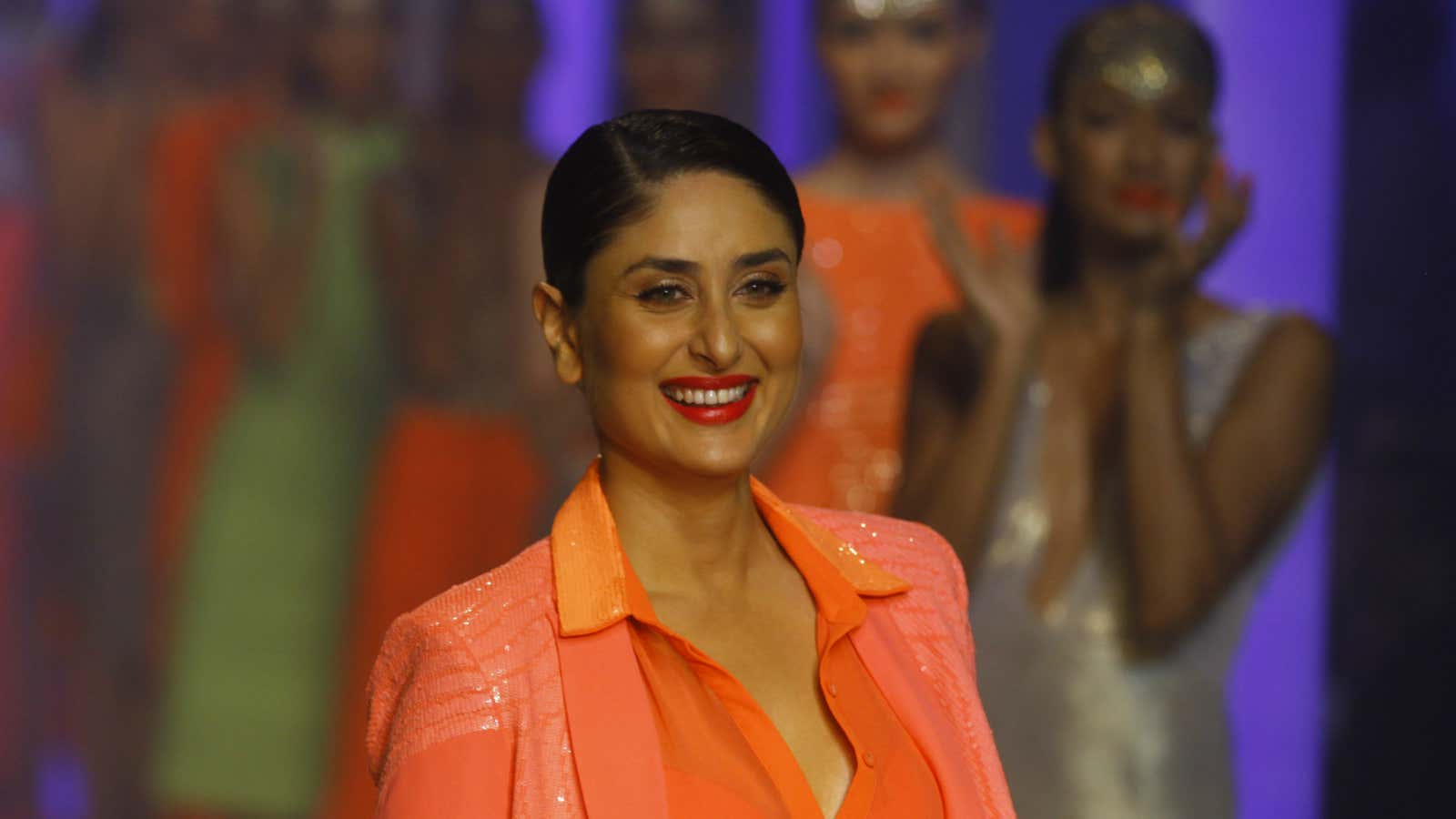Bollywood actresses used to have short shelf lives, compared to their male co-stars.
India’s film industry is replete with instances of top actresses suddenly been relegated to minor, maternal roles, while similarly-aged male actors continued to appear in young, romantic lead roles.
Now, it seems that this generation of Bollywood’s female stars is not scared to age before their audience.
Kareena Kapoor, among the top three highest paid actresses in the industry, recently said that she is proud to be in her mid-30s—often considered the retirement age for Bollywood heroines.
“What’s wrong in saying your age,” the actress said in an interview with an Indian news agency. “I think one should age gracefully. I am proud to be 34 and I think ageing is wonderful. I hate it when I look at somebody and know that they have tried to cover the lines.”
Kapoor, whose family has been steeped in Indian cinema for generations, started her career in 2000. So far she has acted in more than 50 films.
“I don’t want to be an 18-year-old or a 22-year-old girl. I am just done with that phase of my life. That is why I don’t even try to be 22,” she said.
Fighting back
Sexism and Bollywood go hand in hand, both in terms of how female characters are depicted onscreen and how female actors are written about in the media. In a gender test of last year’s blockbuster films, nine out of ten movies failed by a long shot. Only one movie passed what is known as the Bechdel test—or that a film casts at least two women, incorporates a scene or two where they interact with each other, and they talk about something besides a man.
In tabloids, journalists see actresses through the lens of wardrobe malfunctions, weight loss, weight gain and plastic surgeries. But now actresses are defying stereotypes and taking up unconventional roles.
Internationally acclaimed for her role in The Life of Pi and The Namesake, Tabu was one of the first mainstream Indian actors who chose to fearlessly age before everyone’s eyes. In her recent film, Haider, which is a Hindi adaptation of William Shakespeare’s Hamlet, a 43-year-old Tabu played mother to a 34-year-old actor, Shahid Kapoor.
Another Bollywood superstar, Vidya Balan, has chosen female-oriented films in the past few years. In a 2009 film Paa, Balan played a mother to a child suffering from progeria, a rare genetic disorder due to which he looks 80 at the age of 13. Amitabh Bachchan played her son.
The new generation
Some of Bollywood’s younger actresses have refused to stick to beauty stereotypes and have lashed out at the sexism they face in media.
Take for instance Sonakshi Sinha’s smart comeback to her weight-watchers. The emerging Bollywood star wrote in an Instagram post: “Get this: 1) this ain’t ever gonna be me. 2) get over it. 3) i wish u could see which finger i hold up for shallow and idiotic people like yourself.”
Last year, Deepika Padukone made news for lashing out at The Times of India. The country’s highest selling newspaper published pictures of the actress—with a headline “cleavage show.” Padukone response to the post: “YES! I am a Woman. I have breasts AND a cleavage! You got a problem!?.”
Where is the money?
Nonetheless, discrimination in Bollywood runs deep. While male superstars earn eye-popping salaries, female lead actors often get a fraction of that.
Actresses are now prompting a discussion about the disparity in pay. Last year, Priyanka Chopra said there was hope that the industry will get rid of unequal remunerations to male and female actors because of films like Balan’s The Dirty Picture and Kahaani. “When women-centred films become hits, then the disparity will end,” she said.
“I don’t really understand why we are paid less than the male actors because we put in equal effort and the recent past has shown that actresses can deliver a hit film,” actress Aditi Rao Hydari said, “We deserve better pay, equal to what actors get.”
We welcome your comments at ideas.india@qz.com.
